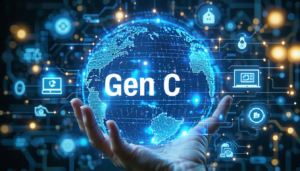
via Jason Considine, MedCityNews
Who is Generation C and how will healthcare adapt to meet their expectations? The term “Gen C” was first introduced circa 2012 by futurist Brian Solis as a way of describing a generation of connected consumers defined not by their age, geography, or income but by their hyper-connected, mobile-first mentality.
While the term “Gen C” was first introduced circa 2012 by futurist Brian Solis as a way of describing a generation of connected consumers defined not by their age, geography, or income but by their hyper-connected, mobile-first mentality, it’s increasingly being used to describe post-pandemic-born babies. It’s also been applied to the mindset and expectations of consumers in the wake of the pandemic. More recently, it has been used to label kids coming of age during the pandemic and how their expectations and experiences are different from ours.
But I’d argue that the pandemic has changed all of us. People have seen what’s possible by way of such pandemic-spawned conveniences as virtual visits, online scheduling, digital sharing of records and texting, while providers have seen more clearly than ever that convenience is the new currency.
In the broadest sense, we’re all Gen C now (Generation Covid). Our expectations of how we experience healthcare have been irrevocably altered, the differences only being ones of degree across demographics.
Solis doesn’t refer to today’s pandemic psychographic of consumers Generation Covid, instead he refers to this new market of decision-makers as Generation-Novel. He did so because novel, like the novel coronavirus, means new. And that’s what this new customer segment is…new.
You can read more of Solis’ work on the subject in Forbes among others.
—
Bonus: What is Generation C?
Back in 2012, digital analyst Brian Solis defined Generation C as the “Connected Consumer.” He pointed out that anyone who integrates technology into their daily routine, regardless of age, shares certain qualities.





Leave a Reply